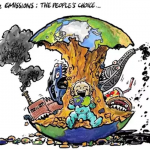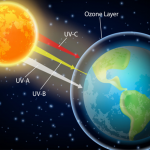
“All natural”, “eco-friendly”, “biodegradable”, “recyclable”, “green” and “chemical free” are some of the most common buzzwords that we come across in many product labels and advertisements nowadays, especially with the world moving towards sustainable growth while prioritizing sustainable development and eco-conscious lifestyles. Being eco-conscious and sustainable is applaudable and a sign for a better future. However, the Greenwashing that takes place as a marketing strategy could be insidious.
Greenwashing is the process of misleading consumers through false marketing of products or services as eco-friendly, environmentally sound or sustainable, merely for the sake of increasing sales. Cooperate Greenwashing is a very common scenario in the present day as many multinational corporations and businesses attempt to rebrand themselves as environmentally conscious as a marketing strategy without having any substantial initiative or motive to be authentically sustainable or eco-conscious.
In a developing country like ours where there is a lacuna in eco-literacy (ability or the knowledge to identify ecological concepts, symbols and behaviors), and lack of awareness about environmental issues among the general public, Greenwashing could rather go unnoticed. According to a study done on consumers’ willingness to pay for green products in Sri Lanka, it has been revealed that “Sri Lankans are willing to pay more for green products not because of their eco-knowledge or environmental concern, but because of the social norms of respecting buyers who would purchase green products” (Wickremeratne, 2020). In such a situation, consumers may not make an effort to identify Greenwashing. Thus, it is important to create awareness on Greenwashing to motivate consumers to make more responsible and conscious purchasing decisions if we need to reach true sustainability as a nation.
In order to discern Greenwashing in the market, ‘TerraChoice’ a Canadian private marketing and environmental consultancy introduced ‘The Sins of Greenwashing’. This involves seven misleading acts done by companies when marketing their products as sustainable or eco-friendly. The first is the ‘sin of the hidden trade-off’ which involves the emphasis of environmental issues at the expense of another concerning issue. For example, producing paper is not necessarily environmentally friendly merely because it is sourced from sustainably-harvested forests. The second sin is the ‘sin of no proof’ where environmental claims are made by companies without any factual evidence or a reliable third-party certification. Products that mention an unspecified percentage of it contains consumer recycled content such as certain tissue products and garments which are some examples.
‘Sin of vagueness’ is the third sin where environmental claims that are made lack specifics but incorporate meaningless statements such as “all natural”. For instance, being “all natural” or “100% natural” does not make the product necessarily “green” or harmless to the environment. Even hazardous heavy metals such as mercury, cadmium and arsenic are naturally occurring. The fourth is the ‘sin of worshipping false labels’ which involves creation of false certifications or labels without any validity to mislead consumers into buying the product. Companies may label their products with glistening logos of certifications without actually going through any legitimate green screening process.
‘Sin of irrelevance’ which is the fifth is when irrelevant environmental issues are emphasized such as labeling a product “CFC-Free” at a time when CFC are already banned worldwide. The sixth is the ‘sin of lesser of the two evils’; making environmental claims that do not give any environmental benefit at all like marketing cigarettes as organic. Last but not the least is the ‘sin of fibbing’ which involves making blatantly false environmental claims. An example would be claiming to have certain certifications or standards like ISO 14000 when the organization has not acquired it.
Likewise Greenwashing may appear in different disguises in the market to mislead any ignorant consumers. Therefore, it is important to educate, spread knowledge and create awareness among consumers as to what true eco-conscious and sustainable products are and how Greenwashing can be correctly identified. This may benefit consumers when making purchasing decisions so that no consumer would get deluded by paper straws and glorified green logos in the future.
References
TerraChoice, 2010. The Sins of Greenwashing Home and Family Edition 2010. Underwriters Laboratories.
Wickremeratne, N., 2020. CONSUMERS’ WILLINGNESS TO PAY FOR GREEN PRODUCTS IN SRI LANKA. Journal of Business and Social Science Review, 1(1), pp.25-33.
Vinuri Malalage, Fourth Year
Department of Geography





